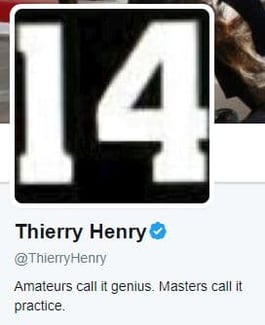Here is a two part challenge: find a single theory that explains why people are successful backed up by good science (spoiler alert #1: this doesn't exist). Then find lots of cool examples of that theory in action that students can relate to and aspire to be like (spoiler alert #2: this is easier than part one but still tricky as 'cool' is subjective and constantly changing).
Growth Mindset
- Story number 2: When Thierry Henry first moved to Arsenal, he
 was short on confidence and low on goals; in fact, he failed to score in his first 8 games. At the time, he said "I've literally had to go back to school and be re-taught everything about the art of striking". This quote helps as young people often only see the end product and not the work that has gone in to getting there. Cool quotes are one thing, but to really capture student's attention, show them his Twitter bio which further drives home his point.
was short on confidence and low on goals; in fact, he failed to score in his first 8 games. At the time, he said "I've literally had to go back to school and be re-taught everything about the art of striking". This quote helps as young people often only see the end product and not the work that has gone in to getting there. Cool quotes are one thing, but to really capture student's attention, show them his Twitter bio which further drives home his point.
So those are the stories. But what about the science? If you've already read about Dweck, feedback and persistence, then these may also be of interest:

Science Research 1:
In a fascinating study of knowing your limits, researchers asked participants to cycle as hard as they could for 4000m. Later, participants were given the same instructions but were able to race against an avatar of their previous ride. What they didn't know was that the avatar was actually going faster than their previous ride. The results? The cyclist rode alongside their avatars, riding significantly further than their previous maximal effort.
Science Research 2:
Robert Howard wanted to know exactly what made great chess players great. He found that, on average, chess experts tend to reach their maximum level after about 750 competitive matches spanning many years. Subsequent studies have confirmed that practice time alone doesn't explain career success (explaining Robert's frustration when the 10,000 hour brigade hijacked and misunderstood his research), although it is clear that chess greatness does not happen overnight nor without lots of effort.
For even more info take a look at our page How to Develop a Growth Mindset, where you'll find links to blogs and research.







